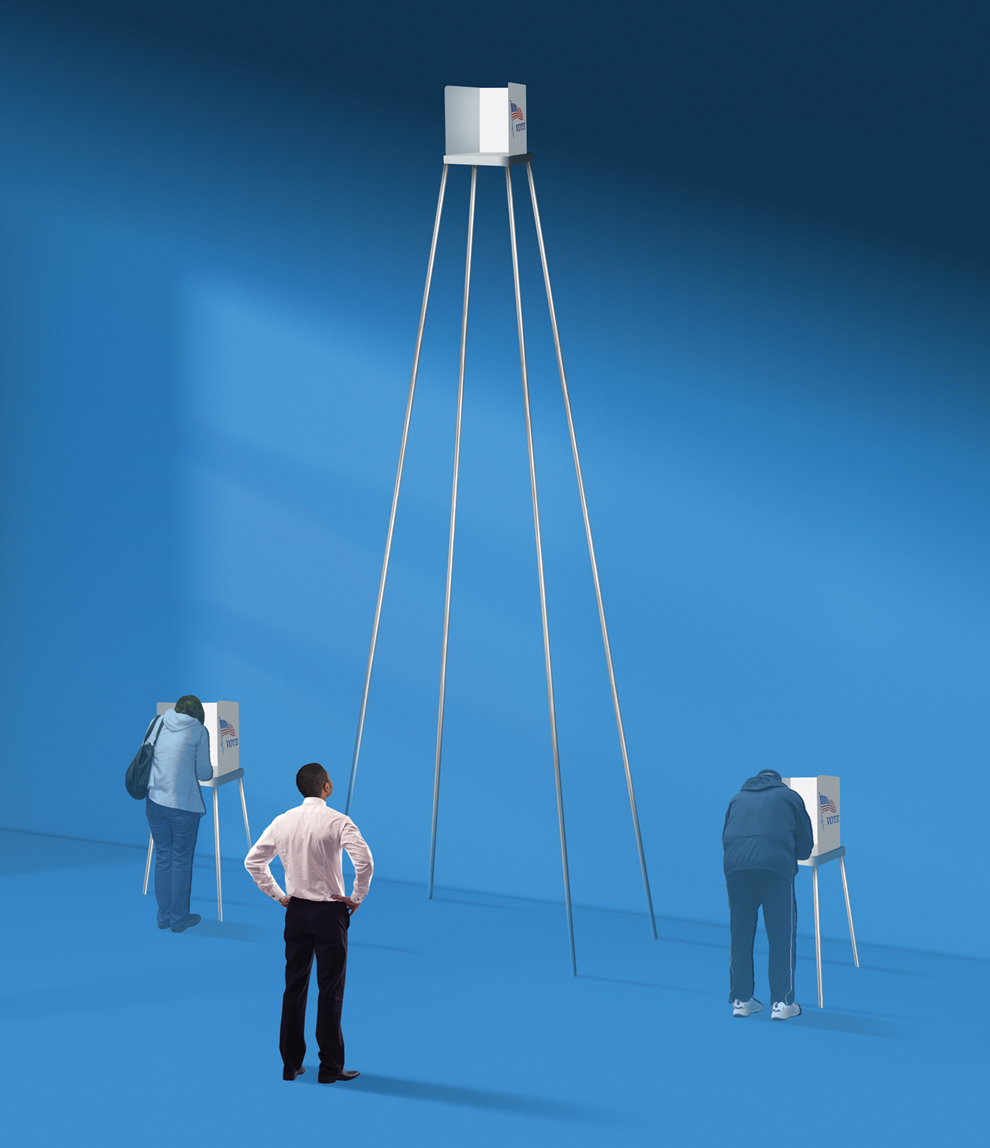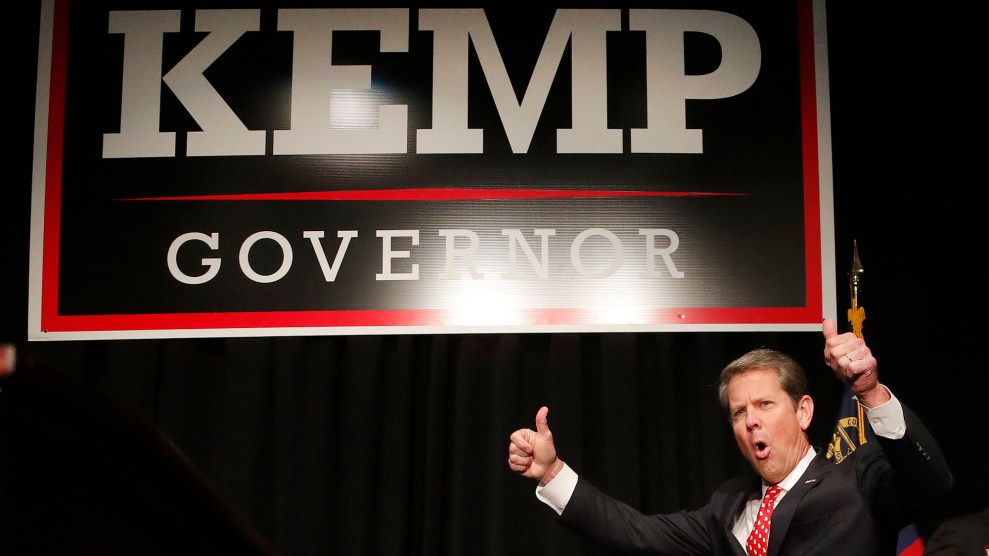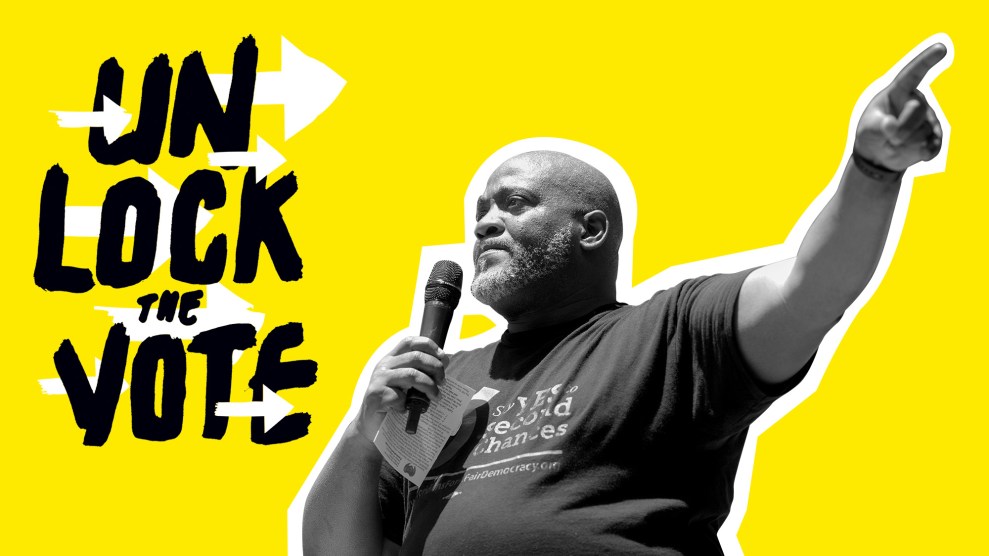
Phoebe Einzig-Roth, an 18-year-old freshman at Atlanta’s Emory University, moved to Georgia in August and was excited to vote in her first election. But when she went to her polling location near campus on Election Day, election officials told her she’d been flagged as a noncitizen. Even though she’d brought three forms of identification—her Massachusetts driver’s license, passport, and student ID—she was forced to cast a provisional ballot.
Three days later, she went to confirm her citizenship at the local election office, where she was assured her vote would be counted. But she kept checking Georgia’s online “My Voter Page” and there was no record it had been. She posted a picture of herself on Facebook wearing an “I’m a Georgia Voter” sticker and wrote, “The thing that infuriates me the most about voter suppression is not that it happened to me, but that it happened, and is continuing to happen to thousands of people all over the country, and most of the time, nothing is done to stop people from being turned away at the voting polls.” She told me a few days later, “I don’t believe my vote will count.”
Einzig-Roth was right that she was far from alone. Voters in Georgia and other states faced onerous barriers to performing their civic duty this year. As these voters were running into obstacles, residents of other states were passing ballot measures to strike down voting restrictions and make voting easier for many more people. These parallel worlds mean voting in America today looks a lot like it did more than half a century ago. We’re becoming two Americas again: one where casting a ballot is a breeze, and another where it’s a pitched battle.
Before 1965, voting laws varied widely by state. It was extremely difficult for African Americans to vote in Alabama or Mississippi but far easier for them to do so in Northern states. The Voting Rights Act ended this dichotomy by striking down the literacy tests and suppressive laws that disenfranchised African Americans in the segregated South. With the passage of the VRA, the country committed itself to ensuring voting rights for all Americans, regardless of race, party, or region.
But the Supreme Court shattered that consensus when it gutted the law in 2013, ruling that states with a long history of voting discrimination no longer needed to get federal approval to make changes to their voting rules. Chief Justice John Roberts rejected the notion that voting discrimination was still “pervasive” or “rampant,” asserting that “our country has changed.” The midterms were a perfect illustration of just how wrong he was. As a result of the court’s decision—along with a slew of laws passed by Republican-controlled state governments over the past decade—24 states had new voting restrictions in place for the 2018 elections.
The stories are now familiar: In Georgia, more than 750,000 voters were purged from the rolls over the past two years by Secretary of State Brian Kemp, who was also the Republican candidate for governor. Some voters near Atlanta waited more than four hours to cast ballots. In Florida, more than 20,000 absentee ballots were rejected, disproportionately from voters of color. In June, North Carolina’s Republican Legislature passed a law that contributed to a 20 percent decrease in early voting locations. Under Texas’ voter ID law, people could vote with a gun permit but not a student ID.
Voter suppression wasn’t limited to Southern states with a history of disenfranchising voters. In North Dakota, 5,000 Native Americans living on reservations were initially barred from voting because a new law wouldn’t accept their P.O. boxes as valid addresses. Iowa instituted a new voter ID law and reduced early voting. In Kansas, the lone polling place in Dodge City, which is 59 percent Hispanic, was moved outside town, a mile from the nearest public transportation.
Yet voters in a half-dozen states—including red and swing states—sent a clear message that voting rights matter. A Florida ballot measure restored voting rights to as many as 1.4 million people with felony records. Maryland, Michigan, and Nevada voters approved reforms like automatic and Election Day voter registration. Colorado, Michigan, and Missouri adopted measures to make redistricting more fair. In addition, two of the biggest champions of voting restrictions, Kansas Secretary of State Kris Kobach and Wisconsin Gov. Scott Walker, lost their gubernatorial races.
Voting rights used to be an obscure topic for election geeks; now they’re a top political issue. House Democrats say their first legislative priority in the new Congress will be a comprehensive package of voting rights, campaign finance, and ethics reforms. That will include the Voting Rights Advancement Act, which would effectively undo the Supreme Court’s 2013 ruling by creating an updated version of the Voting Rights Act, requiring the federal government to approve any voting changes in states with a well-documented history of recent voting discrimination.
In his ruling, Roberts said the VRA was anachronistic because it was based on data from the 1960s. The new law would essentially call his bluff. It would initially cover 11 states: nine in the South, plus California and New York, which have more recently been found to discriminate against Latinos and Asian Americans. The bill would also require all states to get federal approval for election changes that are known to disproportionately affect voters of color, such as strict voter ID laws, tighter voter registration requirements, and polling place closures in areas with large numbers of minority voters.
Rep. Terri Sewell (D-Ala.), the chief sponsor of the VRAA, says voter suppression was a “nightmare” in the midterms and hopes to put “the teeth back into the Voting Rights Act.” Sewell was born in 1965, the year the VRA became law, and grew up in Selma, where civil rights marches had helped the bill pass. Her mother was Selma’s first black city councilwoman, and in 2010 Sewell became the first black woman elected to represent Alabama in Congress. “You wouldn’t have black elected officials had we not had the VRA,” she says. “It’s very personal to me.” Sewell’s office says the new bill could be combined with legislation authorizing other ambitious reforms like nationwide automatic voter registration, two weeks of early voting in every state, and a national restoration of voting rights for ex-felons.
But even if these bills pass the House, they’re unlikely to go anywhere in the Republican-controlled Senate. When the VRAA was first introduced in 2015, it had only one Republican co-sponsor, Sen. Lisa Murkowski of Alaska, and Senate Majority Leader Mitch McConnell has already indicated he opposes it. And President Donald Trump spent the days after the election boosting voter suppression efforts by spreading conspiracy theories about mass voter fraud in Florida.
On Saturday, Kemp was certified as the winner in the Georgia governor’s race. His Democratic opponent, Stacey Abrams, conceded the race but lamented, “Under the watch of the now-former secretary of state, democracy failed Georgia.” We might never know how many people were disenfranchised or dissuaded from voting in the state, but it’s clear that Kemp instituted a series of suppressive policies, which Abrams said allowed him to “tilt the playing field in his favor.” These included aggressive purging of the voting rolls, putting tens of thousands of registrations on hold, and advising counties on how to close hundreds of polling places.
The outcome in Georgia underscores that the country will likely head into the 2020 elections as a two-tiered democracy with separate and unequal voting laws. Some states will have automatic registration, universal vote-by-mail systems, and independent redistricting commissions. Others will have stringent voter ID laws, restrictive registration requirements, and heavily gerrymandered maps.
But the 2018 election demonstrated irrefutably, for the first time in decades, that many voters—including some Republicans—have little tolerance for voter suppression. A recent Pew Research Center survey showed broad support for policies like automatic voter registration, Election Day registration, and voting rights for ex-felons. Voting rights are now a winning issue for Democrats, and a half-dozen state governments that flipped to Democratic control in 2018—including swing states like Colorado, Maine, and Nevada—might expand ballot access in 2019.
For now, measures like the Voting Rights Advancement Act are unlikely to become law, but they can at least draw attention to politically unpopular moves to block the vote. “It’s critically important that we bring to light the ongoing suppression efforts that still exist,” Sewell says. “What better way to emphasize that point than to have major legislation up for a vote?”


















